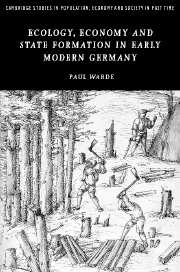Book contents
- Frontmatter
- Contents
- List of figures
- List of maps
- List of tables
- Acknowledgements
- Glossary
- List of abbreviations
- Introduction
- 1 The peasant dynamic
- 2 Power and property
- 3 The regulative drive
- 4 From clearance to crisis?
- 5 The two ecologies
- Conclusions
- Bibliography
- Index
- Cambridge Studies in Population, Economy and Society in Past Time
Conclusions
Published online by Cambridge University Press: 24 July 2009
- Frontmatter
- Contents
- List of figures
- List of maps
- List of tables
- Acknowledgements
- Glossary
- List of abbreviations
- Introduction
- 1 The peasant dynamic
- 2 Power and property
- 3 The regulative drive
- 4 From clearance to crisis?
- 5 The two ecologies
- Conclusions
- Bibliography
- Index
- Cambridge Studies in Population, Economy and Society in Past Time
Summary
The conceptual framework that I have attempted to develop in this volume strives to be one adequate to the task of understanding how the state and the material world intersected, and to enable us to describe and explain what might be implied by early modern society living in the ‘wooden age’. One hopes the reader has been convinced of the degree to which early modern history is intertwined with what is usually considered the realm of botanists or environmental scientists in a ‘historical ecology’. The growth rates of plants to a large degree determined available energy supplies, setting the parameters for economic development. The high rate of friction of wooden surfaces against earthen or, very rarely, paved roads contributed to high transport costs and impeded exchange. The relatively lesser friction, and the continual downward surge born of gravity, gave a comparative advantage to those who could bear their wooden loads on waterways. These things have perhaps been so evident to historians, that they have rarely attempted to investigate their influence in depth or quantify the flows (ecology) or values (economy) of the resources involved. Yet were they any less worthy of detailed attention than rents, wages or profits, over which so much ink (if still not enough) has been spilt? Yet it should also be clear by now that the vegetation of a region, whether a river was navigable in any way or not, and so forth, is the product of human action and choices.
- Type
- Chapter
- Information
- Ecology, Economy and State Formation in Early Modern Germany , pp. 347 - 358Publisher: Cambridge University PressPrint publication year: 2006



